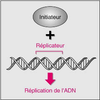Comment mettre en route un cycle de réplication de l'ADN chez les eucaryotes ?
Résumé
Important progress in the understanding of the mechanisms which control the initiation of DNA replication in eukaryotes has been made in the past few years. DNA replication origins have been precisely characterised in the yeast Saccharomyces cerevisiae and much effort has been made in trying to identify their counterparts in metazoans. During the cell cycle, many protein complexes associate with replication origins and play a major role in the regulation of DNA replication. The Origin Recognition Complex (ORC) recognises and binds to replication origins throughout the cell cycle. In G1 phase, the Cdc6 protein and the proteins of the MCM family (minichromosome maintenance 2-7) also bind to the chromatin. Thus, these protein complexes associate sequentially with the chromatin and are all necessary for DNA replication to initiate. During S phase, dissociation of MCM from the chromatin prevents an origin from firing more than once in a single cell cycle. The Cyclin-dependent kinases (Cdks) provide an overall control of the cell cycle. Indeed, Cdks have at least two important function in regulating DNA replication: Cdks both stimulate the initiation of DNA replication and prevent replication to occur more than once in a single cell cycle. Although the details of these remain unclear, recent work indicates that the interaction of the Cdks with Cdc6 and MCM proteins could regulate their binding to the replication origins during the cell cycle. [References: 63]
Pour citer ce document
Chevalier, S ; Chevalier, N, Comment mettre en route un cycle de réplication de l'ADN chez les eucaryotes ?, Med Sci (Paris), 1997, Vol. 13, N° 11; p.I-IX




